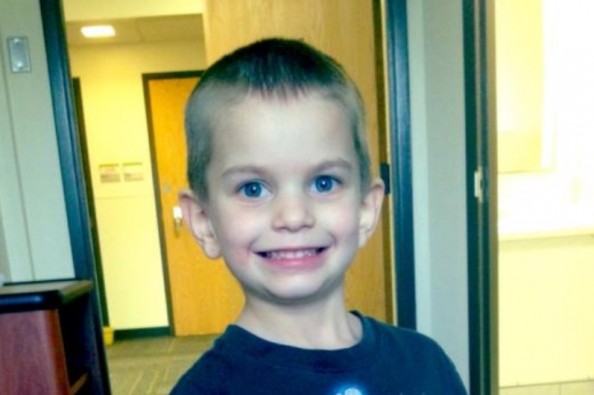A phoenix is a mythical bird that bursts into brilliant, all-consuming, white-hot flames, and then rises from its own ashes once again. Phoenix is also a seven-year-old boy who, like the mythical bird, shines brightly with his own fire, yet sometimes struggles with the possibilities of being burned by it. This is why we fight for Phoenix.
In my communications with Corey Henderson, Phoenix’s father, he says Phoenix started showing signs of being trans “as early as age three.” The family doesn’t force gender roles on Phoenix or his siblings, and his dad states this may be a reason that they didn’t have a solid knowledge that Phoenix was trans until he was around age five. (I’d like to note that it is extraordinarily refreshing to hear of parents who are accepting of identity and don’t force prescriptive gender roles onto children—if more parents were like this, the world would be a much better place.) However, Phoenix being trans is the least of their issues: depression, anxiety, and self-destructive thoughts and actions are the core of Phoenix’s struggles.
Phoenix’s family has been, and is currently, fighting for the necessary care to keep their transgender son safe in body, mind, and spirit. Navigating the mental health system is difficult in the first place; I can speak firsthand of its labyrinthine walls and obstacles, its inequities and discriminatory policies. For children struggling with mental health, accessing care can be significantly more herculean of a task. Children who battle mental health are often swept under the rug by society at large and even inside the healthcare system. There’s this awful, widely held view that very young people with psychiatric disabilities are just acting out or need to be disciplined. And this couldn’t be more untrue. Common misconceptions about conditions like ADHD as well as the stigma surrounding depression and self-harm behaviors work against the ability to access to psychiatric care for people of all ages.
A blog post from December 2013 written by Phoenix’s mom discusses the effect this wide-held, harmful views have: “[someone] told me last week that there is never an excuse to medicate a young child, that a 5-year-old has no reason to be depressed.” That’s just not how depression works; it never has been, and it never will be. It’s not the way anxiety works either, nor ADHD, or any other neurodivergence which impacts the quality of life. “And if I had to choose between a medicated 5-year-old and a suicidal 5-year-old,” she says, “I’ll choose the medicated one.” Yet psychiatric care is expensive, and the price of meds, which has always been too high, has skyrocketed within the past six or so years, making them even more inaccessible for children who need them. And Phoenix’s insurance doesn’t cover much of the psychiatric care he needs to remain safe in mind, body, and spirit.
Just one of many examples of the glaring discrepancies found within the mental health care system is how accessing a therapist is exponentially harder than it is to access a primary care physician. Despite the family’s acceptance of Phoenix’s transgender status and the fact that it isn’t the most pressing issue impacting his life, the system is doubly discriminatory towards transgender individuals of all ages and identities. Luckily, Phoenix is currently working with a therapist who is accepting of LGBTQIA+ individuals, and actively works to treat specifically his mental health and self-destructive behaviors while accepting Phoenix’s reality as an intrinsic part of who he is as a person, not as a psychiatric-related pathology. His therapist says that he’s an otherwise very well-adjusted trans kiddo. Still, there are connections between being transgender and quality of mental health—gender non-conforming people are more susceptible to depression, anxiety, and the emotional and physical components of those, including a higher rate of suicide and suicide attempts. Though Phoenix’s father says Phoenix’s own connection between these intersections of oppression is “loose,” they still exist for Phoenix and they are one of many intersections of oppression that create a societal stigma that makes one intrinsically inseparable from the other for people who exist at this intersection of trans and neurodivergent specifically.
Since mid-2013 Phoenix has attempted suicide multiple times. Mental illness wouldn’t be a struggle if support systems could prevent suicide attempts, if expressions of unconditional love could cure depression; yet as much as we wish that were the case, it isn’t, and Phoenix needs services like medication and long-term inpatient care in addition to the love and support shown by his family.
“Even with trans supportive staff, hospitalization is not all sunshine and roses,” Phoenix’s dad says in regards to their experiences with multiple admissions into psychiatric care, and it absolutely isn’t. I can speak first hand that while it can be extremely beneficial and teach coping mechanisms that carry over into the day-to-day struggles of living with a mental illness such as anxiety or depression—both of which Phoenix lives with—it can be a terrifying, dark experience. Especially for a child. They have encountered transphobia from psychiatric facilities, such as nurses refusing to use male pronouns when referring to Phoenix (a form of denying the reality of being transgender. Misgendering is a traumatic experience for trans people everywhere, contributing to the aforementioned susceptibility to anxiety, depression, suicidal thoughts, and actions). Subsequent admissions to psychiatric care facilities have gotten smoother as the family learns how to express Phoenix’s needs as a transgender individual and as hospital staff becomes more familiar with Phoenix as a person. More prominent than transphobia is the issue of insurance agencies not wanting to cover hospitalizations, especially multiple short-term stays, as well as refusal to assist monetarily with long-term psychiatric care.
The GoFundMe page his mother, Angela Crawford, started in an effort to raise money to help Phoenix has been up since early April 2014, with not even half the goal reached. $3,504 has been raised out of the $12k needed to pay for Phoenix’s stay at a long-term care facility that offers services that the short-term psychiatric facilities he has been in and out of for years cannot provide; his health and safety are at great risk, and the family’s insurance plan does not cover this facility.
I beg you, please consider donating to Phoenix and assist this family in their struggle for their rights and health of their son. Depression, anxiety, and ADHD are all treatable (though not curable), and a proper psych facility along with med regimens could help Phoenix stabilize, help his mother and father and siblings and his loved ones gain peace of mind knowing that Phoenix is safe.
Phoenix’s dad told me during our phone conversation that “the only difference between being transgender and being [cisgender] is . . . there is no difference, really.” This could not be a truer statement. Elimination of societal stigma that remains physically and mentally harmful, is another uphill battle, as is the fight for justice, acceptance, for people who struggle with mental illness. It is a battle that can be won, though. Not easily, and not quickly, but won nonetheless. Helping Phoenix and his family, sharing Phoenix’s story, is one step that can feasibly be taken towards an end result of social justice—for Phoenix, and for all trans youth experiencing discrimination throughout their life journey. To continue to follow Phoenix’s journey and lend support to him and his family, follow his Facebook page, Fighting for Phoenix, and consider donating to his GoFundMe page.





